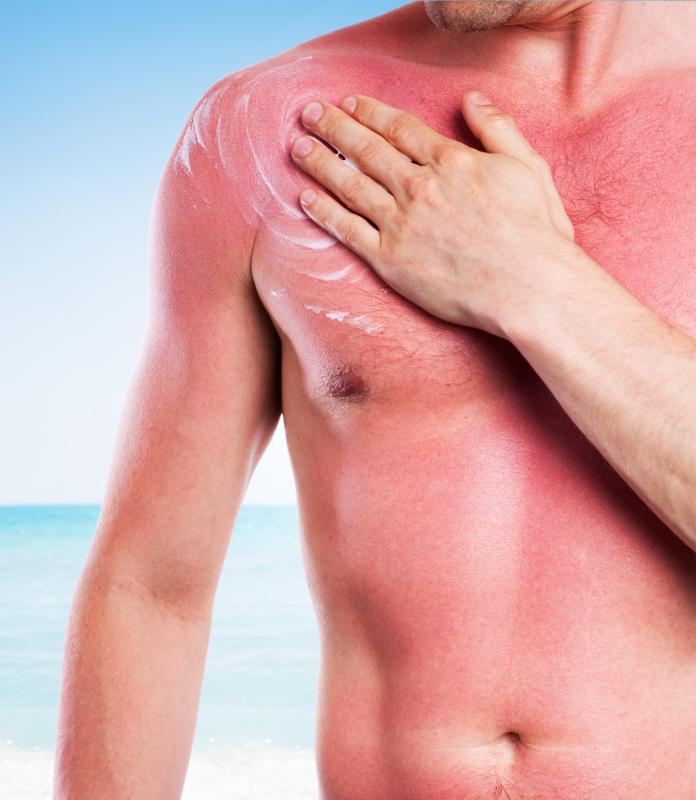At WiseGEEK, we're committed to delivering accurate, trustworthy information. Our expert-authored content is rigorously fact-checked and sourced from credible authorities. Discover how we uphold the highest standards in providing you with reliable knowledge.
What Is Topical Lidocaine?
Lidocaine is a common local anesthetic used to relieve pain and discomfort. The drug is usually administrated in topical form by cream, gel or ointment. Other forms of lidocaine include foam, lotion and patches. Common medical applications involving topical lidocaine include dermal, dental and minor cosmetic procedures. Precaution should be exercised when using this medication.

Low dose topical lidocaine can usually be obtained over-the-counter (OTC) without a prescription. Lidocaine OTC concentrations range from 2.5% to 10%. At lower doses, lidocaine is usually effective in relieving pain associated with minor conditions such as sunburn, hemorrhoids and arthritis. In the case of arthritis and other bone and muscular ailments, lidocaine patches of various concentrations are used.

Dental and cosmetic procedures regularly include lidocaine to provide a more comfortable experience for the patient. Before the patient undergoes a procedure, the dentist will apply a solution of viscous lidocaine — which is a mixture of lidocaine and hydrochloride — topically to the affected areas. Viscous lidocaine is mainly used to prevent the patient from experiencing gag reflex.

Topical lidocaine is also used for cosmetic procedures to dull pain. For example, in addition to a cooling device, patients undergoing laser hair removal can opt for a topical 5% lidocaine cream. Usually the cream is applied before the procedure takes place.
To use topical lidocaine, the affected area should be clean and dry before applying the anesthetic. After cleaning, a thin layer of lidocaine should be applied as directed. Application frequency mainly depends on the condition and concentration strength, but usually low dose lidocaine is applied two to three times daily. Use of topical lidocaine on large areas of the body is not recommended. Over applying the medication can have serious side effects, which can range from mild to life-threatening.

Minor side effects usually include redness, stinging and swelling at the application site. Some people have been known to suffer serious allergic reactions when using lidocaine, however. Symptoms of a serious allergic reaction are extreme rash, swelling of the upper respiratory tract and trouble breathing. Other serious side effects include seizures, irregular heartbeat and respiratory failure. Medical attention should be immediately administered following any of the previously mentioned side-effects.

Those with an anesthetic allergy or history of other allergies should practice caution when taking lidocaine to avoid serious side effects. Use of topical lidocaine in pregnancy should be used under the advice and supervision of a medical professional. Patients with liver or heart disease should not use lidocaine, especially those with irregular heart rhythm disorders, low blood pressure or slow heartbeat.
AS FEATURED ON:
AS FEATURED ON:


















Discussion Comments
I strained my hernia on the bottom part of the stomach. I have been experiencing pain it is no terrible pain but definitely at times uncomfortable. I'm taking advil, but I found 5 percent lidoderm /lidocaine patches. Would these be okay for me to use?
Is it okay to use lidocaine topical cream on a pet?
I would ask my vet but his office is closed right now and won't open until Monday. My cat seems to have cut her paw. One of her toes is almost split into half. I did see some blood but it's not bleeding right now.
I washed her paw with lukewarm water and cleaned it with an antiseptic. But she looks like she's in pain, she won't step on that paw. Can I apply some topical lidocaine on it to ease her pain?
Will it harm her? I know it won't be good if she ingests it but I will watch her and make sure she doesn't lick any of it. I just want to make her feel better until we can go to the vet.
@feruze-- Yea, I always keep a bottle of this at home for burns and insect bites. It's very effective, it cools and numbs the pain quickly.
If you need a topical pain reliever for some minor things like insect bites, this is a good choice. If you're looking for something stronger though, this won't be enough. I would recommend just lidocaine topical gel for more serious conditions.
Has anyone tried aloe vera gel with lidocaine before?
Post your comments